We all need God’s divine protection in our lives.
And that’s because we are powerless on our own.
We are just humans and only see the physical battles in front of us.
But in reality, there is an unseen spiritual battle going on every day of our lives.
Apostle Paul said,
For our struggle is not against flesh and blood, but against the rulers, against the authorities, against the powers of this dark world and against the spiritual forces of evil in the heavenly realms.
That’s why we must always seek God’s power of protection.
God has promised to always stand by the righteous.
He has promised never to leave us in times of trouble.
And what about your unknown enemies who try to hurt you and your family.
Even worse are your fake friends that are willing to harm and destroy you.
But, do not fear.
We serve a living God that is capable of protecting us.
God is willing to protect you from all evil plans against you and your household.
God is also able to protect your loved ones and your friends.
I have compiled bible verses about protection from your enemies to inspire you.
Recommended for you
- Bible verses for when friends let you down
- My Best bible verses in Hard times
- How to treat your enemies Bible verses
- Bible verses about enemies: important scriptures
Bible verses about protection from danger
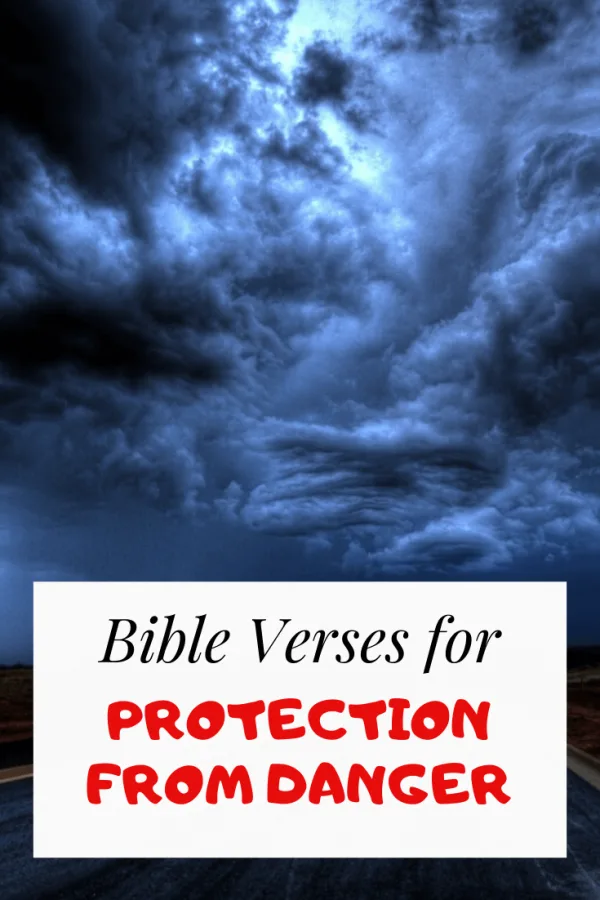
1. Ephesians 6:11
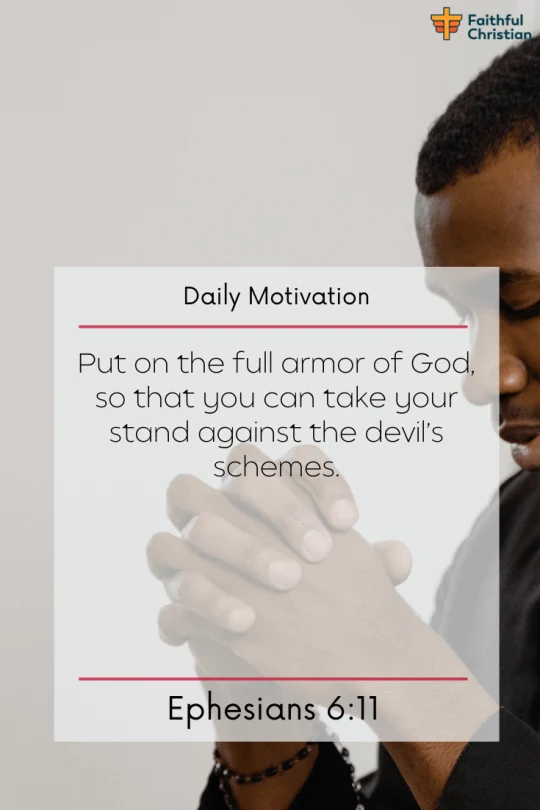
Put on the full armor of God, so that you can take your stand against the devil’s schemes.
Life is filled with challenges, battles not only physical but often spiritual. Ephesians 6:11 brings hope in these times, advising us, “Put on the full armor of God, so that you can take your stand against the devil’s schemes.”
As Christians, this call to arms is vital. Just as soldiers need armor in battle, we need spiritual armor against adversity. This divine armor symbolizes God’s strength, offering protection against spiritual threats.
The armor imagery isn’t merely defensive; it’s empowering. It enables us to confront our adversaries fearlessly, knowing we’re shielded by God’s power. Isaiah 59:17 reinforces this, portraying righteousness and salvation as protective armor.
It’s crucial to grasp the devil’s schemes, for our enemy is cunning. But, as Christians, we don’t live in fear. We live in faith. Our God is powerful. With His armor, we can stand firm against any threat.
To comprehend the power of this stance, we look at Daniel, a biblical figure whose faith stands as a testament to God’s protective power. When Daniel was thrown into the lion’s den, a fate seemingly certain of death, his faith didn’t waver.
He put on his spiritual armor, standing firm in his faith, and God closed the mouths of the lions. Daniel’s armor was his faith, and his faith rendered the lions harmless.
In real life, we face our own ‘lions.’ Picture someone battling addiction, a force that seems insurmountable. In their darkest hour, they find the teachings of their faith, which act as a lifeline. As they don the armor of God, they find the strength to resist temptation and begin recovery.
I invite you to wear this armor. Fasten the belt of truth, wear righteousness as a breastplate, carry the shield of faith. As you do, you’ll stand firm, ready to tackle any challenge. I encourage you to embrace God’s divine protection. It’s more powerful than any threat. Stand tall, armored with God’s might, and you’ll overcome any adversity.
2. 2 Corinthians 10:4
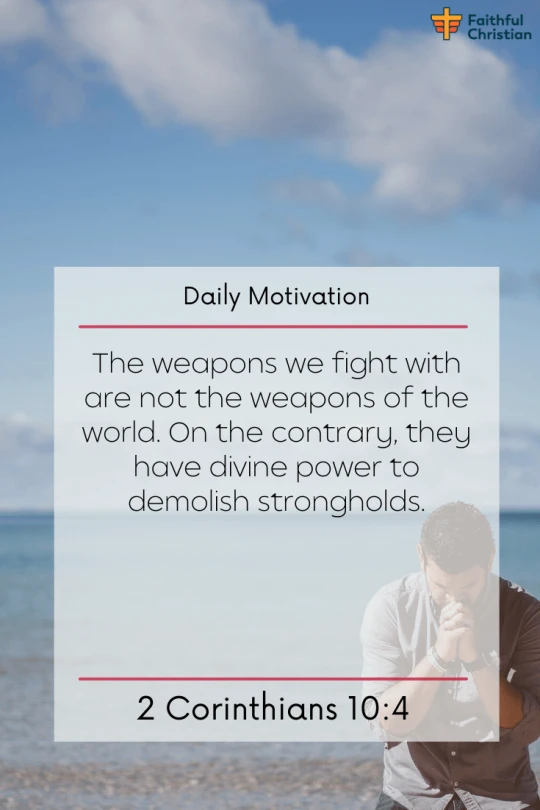
The weapons we fight with are not the weapons of the world. On the contrary, they have divine power to demolish strongholds.
In the spiritual battleground, our arsenal differs significantly from worldly weaponry. Refer to 2 Corinthians 10:4. It defines our tools not as physical, but as divine armaments. They possess an extraordinary capacity to raze spiritual fortresses.
Ephesians 6:12 further explains our battle. It isn’t against human forces. Rather, it’s against spiritual darkness and wickedness. Our real enemies are unseen, lurking in spiritual realms.
So, what forms do these divine weapons take? They are spiritual virtues: faith, love, hope. Like the potent Word of God, which Hebrews 4:12 describes as “sharper than any double-edged sword,” these virtues penetrate and illuminate even the darkest corners of deceit.
Let’s delve into the life of David, the shepherd boy who would be king, to better illustrate this point. Facing the giant Goliath, David didn’t don heavy armor or wield a mighty sword. Instead, his trust was in the Lord, and his weapon was a humble sling (1 Samuel 17:45-50).
Despite Goliath’s towering size and fearsome reputation, David’s faith—his divine weapon—toppled the Philistine giant. This story, a testament to the power of faith over fear, serves as a timeless reminder of the might of divine weapons.
This principle endures today. Imagine a community torn by discord. Instead of resorting to violence, they harness the divine weapons of prayer, unity, and love. These powerful tools dismantle tension, restoring harmony. Here, we witness modern parallels to David’s story – spiritual barriers crumbling before divine weaponry.
In summary, our real adversaries aren’t people, but the sinister forces that sow division and destruction. Our strongholds are barriers of fear, doubt, and sin. We, however, possess divine weapons that can level these strongholds, paving the path to spiritual safety.
In conclusion, when facing danger or enemies, let’s rely on God’s divine armory. Although worldly weapons may falter, God’s power is infallible. In life’s battlefield, let’s brandish our faith. After all, it’s faith that protects, conquers, and eventually, triumphs.
3. Romans 13:12
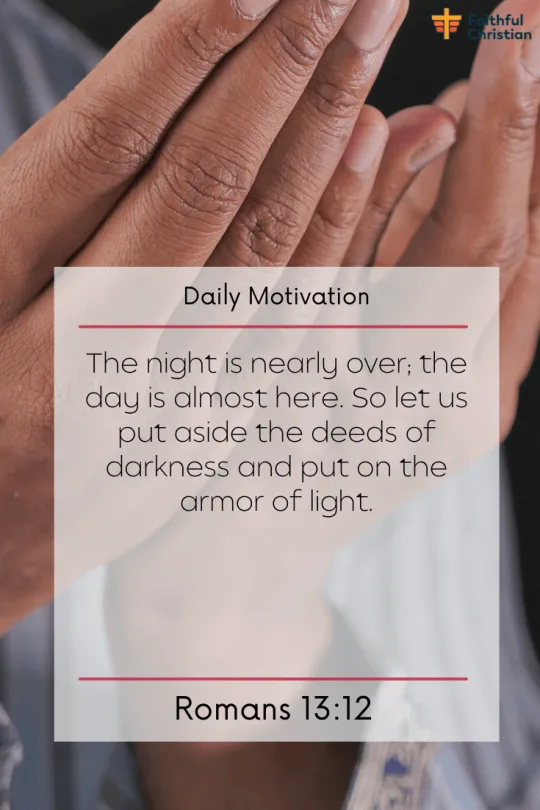
The night is nearly over; the day is almost here. So let us put aside the deeds of darkness and put on the armor of light.
Romans 13:12 unfolds a vibrant spiritual panorama. It portrays our faith journey as a shift from the dark night to the bright day. I see a deep connection between this verse and 1 Thessalonians 5:5. Both affirm our identity as children of the light.
This shift symbolizes spiritual growth. It’s an awakening from the unseen perils of darkness into the safety of daylight. Just as day succeeds night, we evolve from spiritual ignorance to enlightenment.
The verse then nudges us to act. It tells us to choose light over darkness, to swap destructive deeds for the armor of light. A reference to John 8:12 enhances this idea. Jesus stated He’s the light of the world. By following Him, we embrace His protective light.
Consider the biblical example of Paul. In Acts 9:1-19, we find Paul – then Saul – a relentless persecutor of Christians, walking a path of spiritual darkness. But everything changed when he encountered Jesus on the road to Damascus.
Blinded by a divine light, Saul’s physical and spiritual eyes were opened. He shed his old self and became Paul, an indefatigable preacher of the Gospel he once sought to destroy.
Paul’s dramatic transformation epitomizes the transition from darkness to light, marking his movement from danger to divine protection.
Relating this to recent times, people with turbulent pasts also embrace such transitions. Driven by faith, they turn away from destructive ways and seek a path lit by spirituality. They embody the spirit of Romans 13:12, swapping their dark deeds for the light of change.
Romans 13:12 is more than a verse; it’s an action call. It encourages us to anticipate the dawn, to become bearers of light. It asks us to reject darkness and don the armor of light. As we welcome the dawn, we welcome a brighter, safer, and divinely shielded existence. This transition isn’t merely a sunrise; it’s an ascension into a life under God’s protection.
4. Ephesians 6:13
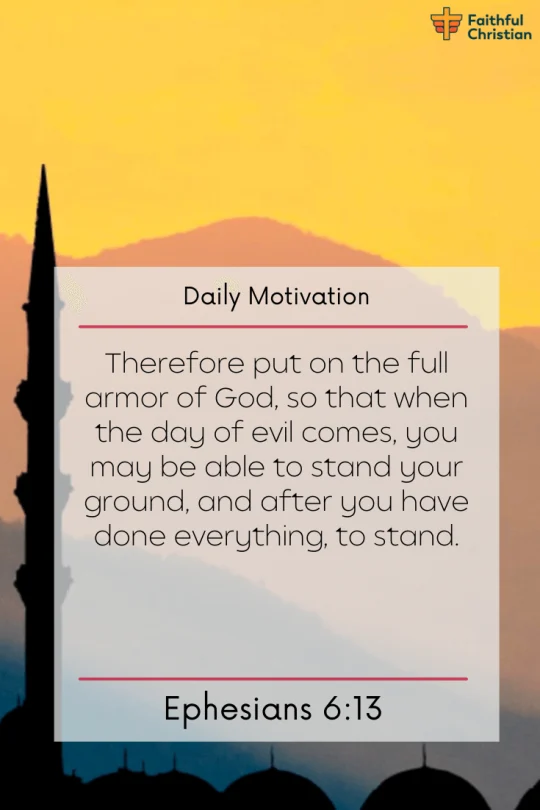
Therefore put on the full armor of God, so that when the day of evil comes, you may be able to stand your ground, and after you have done everything, to stand.
Life can often mirror a battlefield. We all have our struggles. Ephesians 6:13 becomes a beacon in such times. It proclaims, “Put on the full armor of God…stand your ground.”
Ever felt invisible arrows of life hitting you? These are our life challenges. They strike unexpectedly. Ephesians 6:13 encourages us to prepare. “If God is for us, who can be against us?” Romans 8:31 reminds us of this crucial truth.
The “armor of God” plays a dual role. Firstly, it provides protection, guarding us against life’s onslaught. But, it’s more than a shield. It enables us to hold our ground in faith.
The ‘day of evil’ is a symbolic phrase. It represents life’s harsh trials. A sudden medical diagnosis, unexpected job loss, or a personal betrayal. Believers, though, are not helpless. We prepare ourselves with prayer, scripture, and community support.
“Submit to God. Resist the devil, and he will flee from you.” James 4:7 reassures us. God arms us with spiritual strength.
The story of Job is a remarkable testament to this. Despite losing everything, he stood his ground, refusing to curse God and give in to despair. When faced with the ultimate ‘day of evil,’ Job demonstrated the essence of endurance in faith.
Despite his losses, his faith in God’s protection never wavered, and in the end, God restored to Job more than he had initially lost.
The modern application of this verse is equally as powerful. I know of a young man who was under immense pressure from his peers to engage in illegal activities.
However, he stood his ground, refusing to compromise his moral standards. Although he endured scorn and rejection, he, like Job, demonstrated the power of standing firm in faith.
In summary, Ephesians 6:13 extends beyond mere divine protection. It’s a call for believers to arm themselves in faith. It encourages us to stand firm against any enemy or danger. God’s protection not only shields us from harm. It empowers us to stand strong amidst adversity.
As we embrace this truth, we tap into our true strength. So, I urge you, don your full armor of God. Stand tall and discover your true power.
5. 1 Thessalonians 5:8
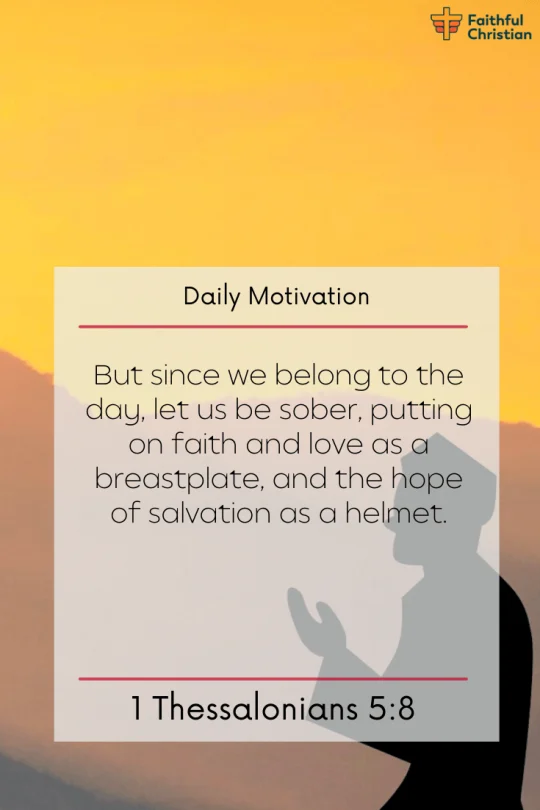
But since we belong to the day, let us be sober, putting on faith and love as a breastplate, and the hope of salvation as a helmet.
In the world’s relentless whirl, danger can be an uninvited guest. As humans, our instinct is to seek safety and protection. Amid such times, the profound wisdom of 1 Thessalonians 5:8 offers solace, a reminder of the spiritual armor of faith, hope, and love.
“Belonging to the day,” as Paul states, signifies an enlightened life. It urges us towards sobriety, vigilance, and ethical choices. Indeed, our decisions echo the armor we wear in life’s battles.
Faith and love form a divine breastplate, a shield for our hearts. The faith instills trust in God, while love embodies His character, creating a robust defense against negativity and fear. Complementarily, the “hope of salvation” stands as a protective helmet, safeguarding our thoughts from despair and defeat.
In the words of 1 Corinthians 13:13, “faith, hope, and love” aren’t merely defensive tools, but also enduring virtues. These are resilience forces, helping us combat adversity. Remember Romans 5:5, which underlines that our hope lies in God’s love, fortifying us to conquer trials.
To better understand these concepts, consider Joseph’s story in Genesis 37-50. Betrayed by his brothers, sold into slavery, and falsely accused, he faced countless trials. Yet, he wore his spiritual armor with dignity.
He held onto faith, love, and hope, not allowing bitterness or despair to sway him. The result? I believe his resilience in the face of adversity led to his rise to prominence in Egypt.
In our real lives, this spiritual armor is just as potent. Imagine someone battling serious illness. The pain is overwhelming, the prognosis daunting. Yet, they choose to don the helmet of hope, protecting their thoughts from despair.
They wear faith and love as a breastplate, allowing these virtues to fortify their hearts against fear and uncertainty. Despite the harsh reality, their spirit remains unbroken.
In conclusion, 1 Thessalonians 5:8 is a timely call to arm ourselves with faith, love, and hope, the spiritual armor against life’s dangers. In a world of uncertainty, let’s heed this call, stay vigilant, live enlightened, and hold on to hope. After all, armed with such divine protection, what fear should we harbor?
6. 1 Peter 5:8

Be alert and of sober mind. Your enemy the devil prowls around like a roaring lion looking for someone to devour.
Have you ever sensed danger in a dark alley at night? Shadows become intimidating figures, noises cause your heart to race. It’s a stark reminder – vigilance is key. Similarly, we are urged to remain vigilant in our spiritual journey.
In 1 Peter 5:8, Peter warns us, “Be alert and of sober mind. Your enemy, the devil, prowls around like a roaring lion looking for someone to devour.”
This analogy of a prowling lion paints a vivid picture of active danger. It symbolizes the spiritual perils we encounter – doubts, negative influences, and tempting situations. These threats are dynamic, they prowl and pounce when we least expect.
Along with the warning, Peter equips us with a defense strategy – alertness and sobriety. To be alert means being aware of our spiritual surroundings, ready to identify threats that can lead us astray.
Sobriety here isn’t just abstaining from intoxicants; it signifies clear-mindedness and self-control. We are urged to lead our lives guided by conscious decisions rooted in our faith.
An excellent biblical example is Jesus resisting Satan’s temptations in the wilderness. Despite his physical weakness, Jesus was spiritually alert and identified Satan’s attempts to mislead him. He remained clear-headed, countering each temptation with God’s word.
This scenario illustrates the potency of scriptures and unwavering faith as shields of spiritual protection.
You might ask, “How does this apply to my daily life?” Imagine this. You’ve had a rough day, and on your commute home, an aggressive driver cuts you off, your heart pounds, and anger surges. The temptation to retaliate, to lean into the rage, is strong.
But you remember Peter’s advice. You take a deep breath, choosing to stay alert and sober-minded. Instead of escalating the situation, you offer a silent prayer for the other driver and continue your journey in peace.
In conclusion, the teachings in 1 Peter 5:8 are not only about avoiding danger. They stress the importance of recognizing threats and being alert.
In my spiritual journey, I find solace in the fact that though the enemy may prowl, I am not defenseless. As we navigate life, let’s arm ourselves with vigilance, sobriety, and faith in God’s word, ensuring our protection from spiritual perils.
7. 2 Corinthians 2:11
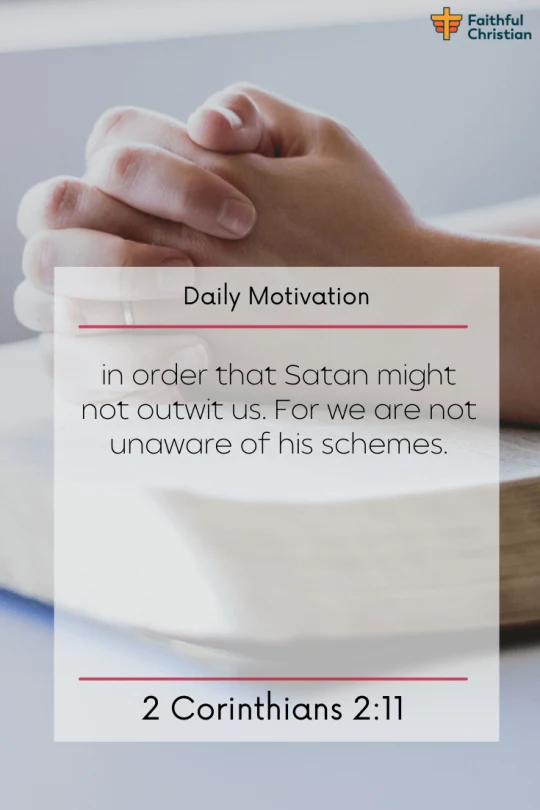
in order that Satan might not outwit us. For we are not unaware of his schemes.
The realm of the spiritual is a battlefield, the weapons of choice being wisdom and understanding. In 2 Corinthians 2:11, we’re reminded, “In order that Satan might not outwit us. For we are not unaware of his schemes.” This vital scripture exposes spiritual warfare’s reality.
Awareness of your opponent’s tactics is crucial in any conflict. Satan, our spiritual adversary, is an expert in deception. His strategies are often subtle, almost invisible. Yet, we are not blind to his devices.
Ephesians 4:27 warns us not to “give the devil a foothold”. In other words, we must safeguard our minds and hearts against Satan’s subtle influences. James 4:7 offers a practical strategy: “Submit yourselves, then, to God. Resist the devil, and he will flee from you.”
A trip back to Genesis 3 unveils a timeless example: Eve in the Garden of Eden. Here, we witness the first instance of Satan’s deception. The snake convinces Eve to eat the forbidden fruit, promising divine wisdom. The outcome? Devastating. This narrative serves as a potent reminder of the harm Satan’s deception can cause.
I invite you to consider a contemporary example: online scams. A deceptive email promising great fortune almost traps an individual. But being aware of such trickery, they avert potential loss. This is discernment at play, saving them from a scammer’s clutches.
In both instances—Biblical and contemporary—discernment emerges as a powerful ally. It helps us distinguish truth from lie, sincere words from deceptive ones. Discernment is our shield, protecting us from the enemy’s deceitful tactics.
So, how do we refine this discernment? By delving into God’s word, extracting wisdom, and vigilantly applying it. Vigilance here isn’t about fear; it’s about relying on God, the ultimate source of wisdom.
God has equipped us with the tools to outwit the devil’s plots. God’s wisdom is our most potent weapon, leading us to victory. Our role? Stay vigilant, foster discernment, and rely on God’s wisdom. Remember, on this spiritual battlefield, God is our commander, ensuring our victory.
8. 2 Thessalonians 2:9-11
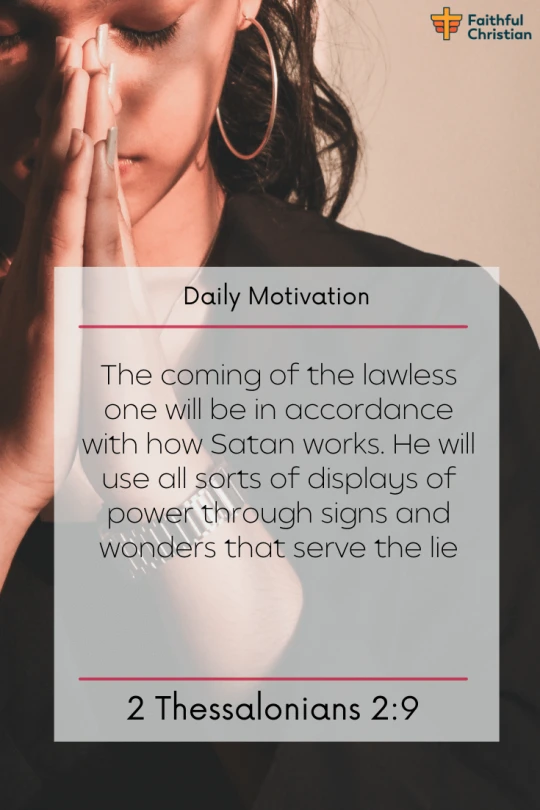
The coming of the lawless one will be in accordance with how Satan works. He will use all sorts of displays of power through signs and wonders that serve the lie,
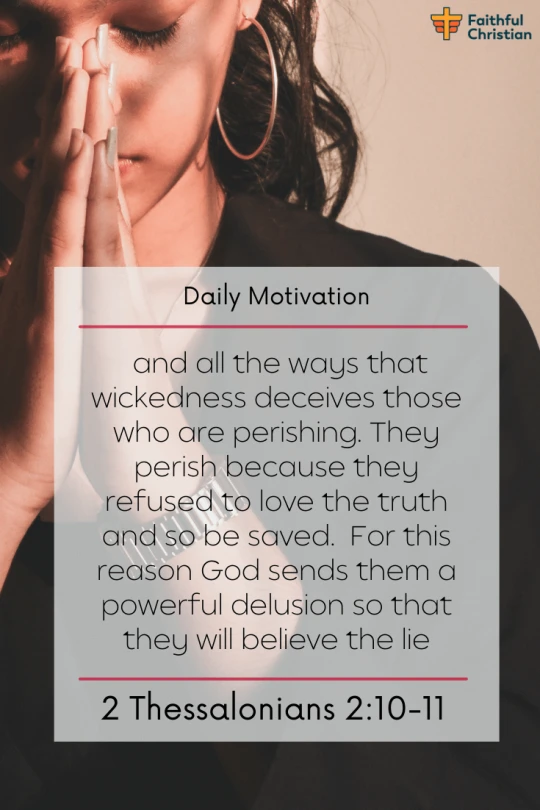
10 and all the ways that wickedness deceives those who are perishing. They perish because they refused to love the truth and so be saved. 11 For this reason God sends them a powerful delusion so that they will believe the lie
Deception is a dangerous guise. It’s a mask that conceals the true form of danger. 2 Thessalonians 2:9-11 delves into this truth. The scripture paints a grim picture of a lawless one who, mimicking Satan’s tactics, employs deception to perpetuate lies. The essence of this danger is hidden, requiring our discernment to unmask it.
Discernment, as emphasized in Matthew 24:24, is our beacon in the darkness. It’s our means to separate truth from lies, to spot the wolves in sheep’s clothing. Without discernment, we’re like a ship lost at sea. But with it, we become capable of recognizing the falsehoods woven by the enemy.
Our enemy, Satan, is a master of deception. His tactics, underscored in scriptures like 1 John 2:18, involve lies and distortion. His aim? To lure away those walking the path of righteousness. But the price of falling for his deceptions is steep, leading to what’s termed as ‘spiritual death’—a fate involving eternal separation from God, our life-source.
God, in His boundless wisdom, warns us of such dangers. The prophecy about the lawless one in 2 Thessalonians 2:9-11 is a clear alert. It calls to mind the Israelites’ encounter with false prophets in Deuteronomy 13:1-5. They were cautioned against being swayed by miracles. This age-old lesson remains a critical reference for us.
In today’s world, we can draw parallels with the menace of destructive cults. These groups employ manipulative tactics reminiscent of the lawless one, exploiting human vulnerabilities. Yet, there are stories of individuals who, gifted with discernment, dodge the danger.
In conclusion, while the enemy is cunning and the danger real, we are not defenseless. Equipped with discernment and God’s word, we can resist the enemy’s deceptions. We must heed God’s prophetic warnings and remain steadfast in His word. For in His loving protection, we find our safety.
9. Psalm 9:9
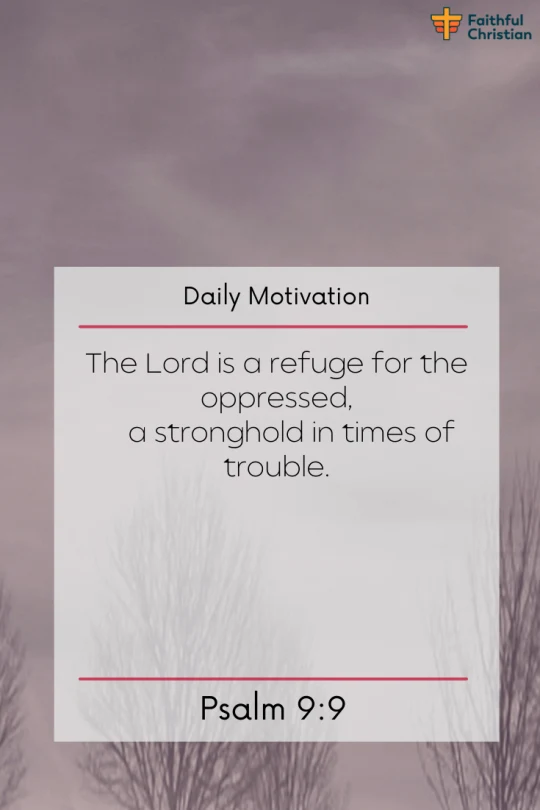
The Lord is a refuge for the oppressed,
a stronghold in times of trouble.
Can you envision a sanctuary in life’s fiercest storms? Psalm 9:9 extends such an offer, declaring, “The Lord is a refuge for the oppressed, a stronghold in times of trouble.” This divine protection, a balm for our deepest fears, is the focus of our discourse.
The image of God as a refuge evokes a steadfast shelter against life’s tempests. Picture a lighthouse, unyielding against tumultuous waves, radiating hope amidst chaos. This refuge isn’t passive; God actively strengthens us in times of weakness.
He is “ever-present,” according to Psalm 46:1, offering immediate assistance in times of distress. Such a promise provides profound reassurance.
What does this look like in real life? Let’s journey back to a biblical example that wonderfully illustrates God’s protective nature – the story of Noah and the ark.
Here was a man, surrounded by a world gone mad, yet in the midst of it all, God provided him with specific instructions to build an ark – a literal refuge from the impending storm. And it wasn’t just about physical safety. Inside that ark, Noah found protection from the corruption that drowned the world outside.
In essence, God’s directions provided Noah with an opportunity to escape physical danger and spiritual decay.
Further, in Psalm 18:2, the psalmist terms God as his “rock,” “fortress,” and “deliverer.” Here, “rock” symbolizes God’s unyielding stability.
As a “fortress,” God forms a defensive barrier against both visible and unseen foes. The term “deliverer” indicates action – God doesn’t merely offer shelter, He actively intervenes, delivering us from danger.
Facing oppression or danger can seem like an endless tunnel. However, God’s protective nature doesn’t just provide a shield in troublesome times. He also accompanies us, a constant beacon guiding our way forward.
To wrap up, God’s protective nature, as encapsulated in these Psalms, is a reassuring reminder. In the face of danger or oppression, we’re not alone. God, an active force, offers us strength, shelter, and comfort. In the storm’s eye, His unswerving faithfulness remains our steadfast anchor.
10. Psalm 119:114

You are my refuge and my shield;
I have put my hope in your word.
In the realm of uncertainty, a constant remains – God, our Protector. Psalm 119:114 articulates this beautifully: “You are my hiding place and my shield; I have put my hope in your word.” The verse elevates God from a passive observer to an active guardian in our lives.
Imagine a shield. Its purpose is clear – defense. It’s a barricade in the battle, thwarting the enemy’s assault. But this is no ordinary shield – it’s divine, unyielding, and impenetrable. No danger can breach this divine shield held by our Heavenly Father.
Moreover, God is a hiding place. Imagine fleeing from foes or finding yourself amid turmoil. The promise of a refuge, a safe sanctuary away from chaos, is incredibly comforting. Psalm 32:7 echoes this sentiment: “You are my hiding place; you will protect me from trouble and surround me with songs of deliverance.”
Equally, the verse underscores hope in God’s word. Our hope anchors itself in God’s unwavering promises, not mere wishful thinking. Psalm 18:30 corroborates this: “As for God, His way is perfect: The Lord’s word is flawless; He shields all who take refuge in Him.”
Take Moses’s story, for instance. In Exodus 33:22, when God’s glory was about to pass by, God put Moses in the cleft of a rock and covered him with His hand. Moses, faced with the incomprehensible power of God’s glory, found God to be his shield and hiding place.
In conclusion, Psalm 119:114 is a potent testimony of trust in God. It highlights God as a refuge and protector. The verse also underlines the importance of hope in God’s word – a source of comfort, a beacon in darkness. Let us, therefore, strive to emulate the spirit of this verse in our lives.
Let’s lean on God, our protector, hiding place, and shield. Let’s trust His word, our eternal safety. And let’s affirm, “You are my hiding place and my shield.”
11. Psalm 91:1
12. Psalm 27:5
13. Psalm 31:20
14. Psalm 143:9
15. Psalm 118:6-9
Recommended for you
-
Isaiah 41:10
-
Psalm 27:1-3
-
Romans 8:31
-
Psalm 124:8
-
Hebrews 4:16
-
Psalm 56:4
-
Matthew 10:28
-
Isaiah 54:17
-
John 10:28-30
-
Isaiah 50:8
-
Proverbs 18:10
-
2 Samuel 22:3
-
Isaiah 26:4
-
Psalm 91:2
-
Psalm 144:2
-
Psalm 61:3-4
-
1 Peter 1:5
-
1 Kings 1:29
-
Psalm 31:5
Recommended for you
- Bible verses for when friends let you down
- My Best bible verses in Hard times
- How to treat your enemies Bible verses
- Bible verses about enemies: important scriptures
Frequently Asked Questions
What Psalm is the prayer for protection against evil?
For those seeking refuge from evil, Psalm 91 stands as a beacon. The Psalmist proclaims trust in God as both refuge and fortress. Throughout the Psalm, it paints a vivid picture of divine protection, encapsulating physical and spiritual dangers.
What Scripture protects you from enemies?
Protection against adversaries is emphasized in Psalm 27:1-3. Here, the Psalmist identifies God as both light and salvation. There’s an assurance that despite the advance of the wicked, they will ultimately stumble and fall.
How does God protect us from danger?
God’s protective care spans physical and spiritual realms. The Bible assures us of His unyielding watchfulness. Psalm 121:7-8 captures this concept, affirming God’s eternal vigilance over our lives.
What does the Bible say about protection from dangers seen and unseen?
Scriptures such as 2 Thessalonians 3:3 and Ephesians 6:11-12 underscore God’s protection from dangers, both seen and unseen. The latter encourages the putting on of God’s full armor to stand firm against the devil’s schemes, revealing the nature of the battle against spiritual forces.
Which Psalms is for protection?
For those seeking divine protection, Psalms 23 and 91 are often referred to. Psalm 23:4 captures the essence of divine comfort in times of fear, while Psalm 91:10-11 assures us of God’s angelic protection.
How do you pray to protect against your enemies?
If seeking divine protection against enemies, Psalm 3:3-5 can inspire your prayers. It portrays the Lord as a shield, a glory, and the one who answers when we call, providing sustenance and comfort.
What are some Bible verses about protection and safety?
Scripture teems with assurances of safety and protection. For instance, Proverbs 18:10 likens God’s name to a strong tower, providing refuge for the righteous. Isaiah 41:10 promises God’s strengthening help and upholding right hand.
Which Bible verses can be used to protect your home from evil?
To safeguard your home from evil, consider Psalm 121:7-8 and Psalm 127:1. They provide reassurance that God watches over our lives, our comings, and goings, and that He is instrumental in the construction of a home and city.
How does God protect us from dangers, both seen and unseen?
The Bible reiterates God’s protection against seen and unseen dangers. Ephesians 6:13 advises donning God’s full armor for spiritual battles, while Psalm 121:5-8 reassures us of God’s shade and eternal watchfulness over our lives.
What are some Bible verses about destroying enemies?
The Bible advises overcoming evil with good rather than seeking destruction of enemies. Romans 12:19-21 encourages leaving vengeance to God, offering kindness to adversaries instead.
What are some spiritual protection Bible verses?
For spiritual fortification, Ephesians 6:11-18 is a common reference. It proposes donning God’s full armor—truth, righteousness, peace, faith, salvation, and the Word of God—to stand against demonic schemes.
Are there any Bible verses specifically about protecting life?
Life’s protection is a central theme in the Bible, embodied by Psalm 121:7. It confirms God’s unwavering vigilance over our lives, shielding us from all harm.
Are there any Bible verses that talk about protection from disease?
In terms of disease protection, Exodus 23:25 pledges divine health. It promises God’s blessing on food and water, as well as the removal of sickness.
Can you provide some Bible verses on protection from death?
For those seeking solace in the face of death, Psalm 23:4 serves as a comforting promise. It assures believers of God’s guiding presence, even when traversing the valley of the shadow of death.
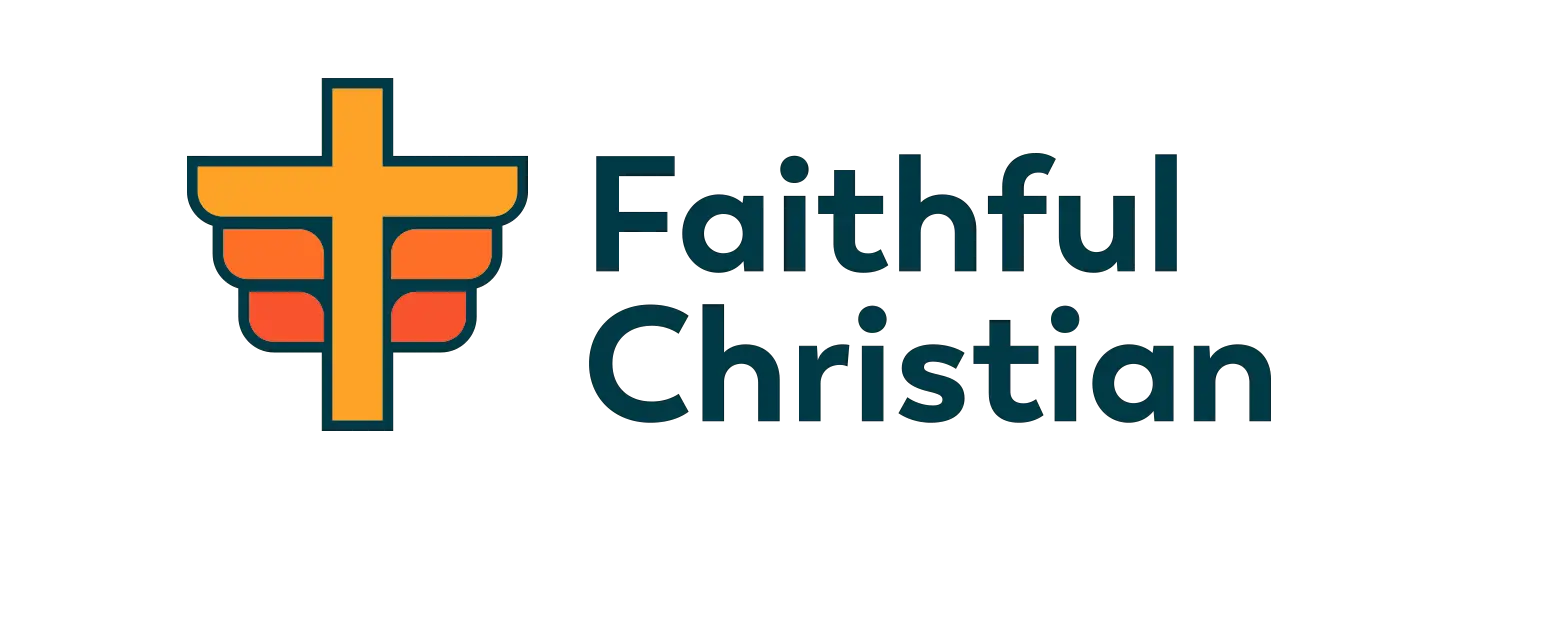
Ngura Bazil
Saturday 3rd of July 2021
it's helpful to us as a christian so it can strengthen our faith